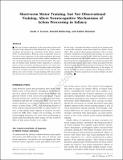Files in this item
Short-term motor training, but not observational training, alters neurocognitive mechanisms of action processing in infancy
Item metadata
| dc.contributor.author | Gerson, Sarah | |
| dc.contributor.author | Bekkering, Harold | |
| dc.contributor.author | Hunnius, Sabine | |
| dc.date.accessioned | 2015-04-07T09:01:02Z | |
| dc.date.available | 2015-04-07T09:01:02Z | |
| dc.date.issued | 2015-06 | |
| dc.identifier | 162013998 | |
| dc.identifier | 4f405326-4fa0-45aa-abd2-51820bdd8eff | |
| dc.identifier | 84928736656 | |
| dc.identifier.citation | Gerson , S , Bekkering , H & Hunnius , S 2015 , ' Short-term motor training, but not observational training, alters neurocognitive mechanisms of action processing in infancy ' , Journal of Cognitive Neuroscience , vol. 27 , no. 6 , pp. 1207-1214 . https://doi.org/10.1162/jocn_a_00774 | en |
| dc.identifier.issn | 0898-929X | |
| dc.identifier.uri | https://hdl.handle.net/10023/6439 | |
| dc.description.abstract | The role of motor experience in the processing of perceived actions is hotly debated on both behavioral (e.g., action understanding) and neural (e.g., activation of the motor system) levels of interpretation. Whereas some researchers focus on the role of motor experience in the understanding of and motor activity associated with perceived actions, others emphasize the role of visual experience with the perceived actions. The question of whether prior firsthand motor experience is critical to motor system activation during perception of actions performed by others is best addressed through studies with infants who have a limited repertoire of motor actions. In this way, infants can receive motor or visual training with novel actions that are not mere recombinations of previously acquired actions. In this study, 10-month-old infants received active training with a motorically unfamiliar action that resulted in a distinct sound effect. They received observational experience with a second, similarly unfamiliar action. Following training, we assessed infants' neural motor activity via EEG while they listened to the sounds associated with the actions relative to a novel sound. We found a greater decrease in mu power to sounds associated with the motorically learned action than to those associated with the observed action that the infants had never produced. This effect was directly related to individual differences in the degree of motor learning via motor training. These findings indicate a unique effect of active experience on neural correlates of action perception. | |
| dc.format.extent | 452679 | |
| dc.language.iso | eng | |
| dc.relation.ispartof | Journal of Cognitive Neuroscience | en |
| dc.subject | EEG | en |
| dc.subject | Learning | en |
| dc.subject | Motor control | en |
| dc.subject | Social cognition | en |
| dc.subject | BF Psychology | en |
| dc.subject | NDAS | en |
| dc.subject.lcc | BF | en |
| dc.title | Short-term motor training, but not observational training, alters neurocognitive mechanisms of action processing in infancy | en |
| dc.type | Journal article | en |
| dc.contributor.institution | University of St Andrews. School of Psychology and Neuroscience | en |
| dc.identifier.doi | 10.1162/jocn_a_00774 | |
| dc.description.status | Peer reviewed | en |
This item appears in the following Collection(s)
Items in the St Andrews Research Repository are protected by copyright, with all rights reserved, unless otherwise indicated.

